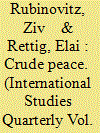| Srl | Item |
| 1 |
ID:
160575


|
|
|
|
|
| Summary/Abstract |
Does trading oil promote peace between rival countries? Despite the optimism of liberal theories on the value of economic interdependence, countries worry more about the possibility of being cut off from vital oil supplies than about forgoing the potential economic gains of trade. The 1979 Israeli-Egyptian peace is an exception to this rule, as the inclusion of oil trade agreements during negotiations succeeded and eventually became a positive aspect of the relations between the two states. However, this resulted not from the promotion of economic interdependence during negotiations, but from its avoidance. The United States guaranteed to compensate Israel for any breach in the oil agreement. This permitted Israel and Egypt to trade freely without imminent concern of becoming too dependent on one another. In consequence, they slowly built mutual trust over the years. Israeli and US declassified documents shed light on the creation of this unique oil trade agreement during the final phase of peace negotiations. We argue that a third-party guarantee to compensate for a breach in energy trade is often a necessary condition for such deals to succeed, provided that the guarantor meets certain preconditions unique to energy trade.
|
|
|
|
|
|
|
|
|
|
|
|
|
|
|
|
| 2 |
ID:
144683


|
|
|
|
|
| Summary/Abstract |
This article examines the reasons why the Israeli government chose not to apply for membership in the International Energy Agency (IEA), though it has been eligible to do so since 2010. The many benefits the IEA has to offer Israel in terms of enhancing its energy sector’s security, advancing environmental policies, and further integrating it with international markets and standards indicate that Israel would be wise to join the agency. A number of examples of the problematic process by which energy and environmental policy decisions are made in Israel will be used to illustrate this argument. Despite these benefits, Israel has rejected any notion of membership following a 2010 interdepartmental discussion between several ministries. The arguments raised during these discussions help shed some light on how the ‘security-mindset’ that tends to dominate Israeli policymaking serves as a limit to Israel’s potential progress of both its energy sector and its environmental policies.
|
|
|
|
|
|
|
|
|
|
|
|
|
|
|
|